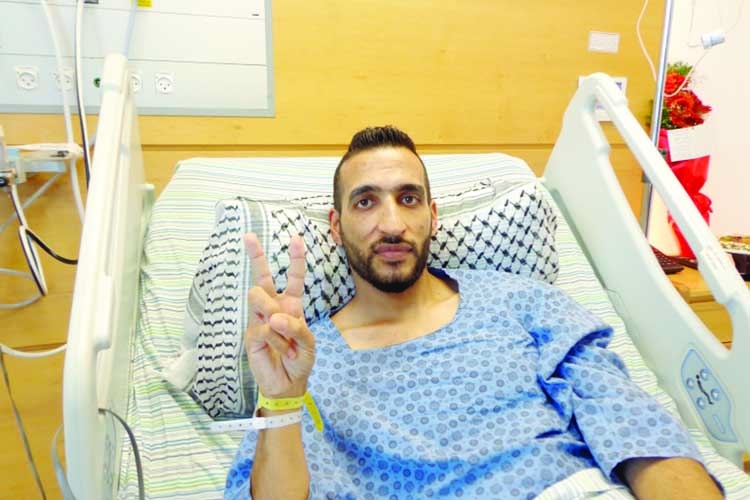
Al Jazeera :
Smiles abound as a steady stream of visitors enters Kayed Fasfous’s room at a hospital in Ramallah.
The former Palestinian prisoner has been recovering here since his release this week after ending a 131-day hunger strike in protest against being held in what Israel calls “administrative detention”, which allows the indefinite imprisonment of individuals without trial or charge.
“It is wonderful to be free and surrounded by friends and family,” Fasfous, who was transferred to the hospital on Sunday, told Al Jazeera.
The former bodybuilder has lost about 45kg as a result of his refusal to take any food, supplements, vitamins or saltwater for more than four months. He was moved from detention to an Israeli hospital in October.
The hunger strike has taken an enormous mental and physical toll on Fasfous, his memory was affected and his emaciated body is still very weak – but his spirits are high.
“I took the decision to go on the hunger strike because I wanted my freedom. I was also certain of the justice of my cause because this land belongs to Palestinians and we have the right to live” said the 32-year-old, adding that he felt vindicated by the reversal of his administrative detention that had begun in late 2020.
“This is victory.”This is a modal window.
A mechanic by profession, Fasfous had previously been imprisoned for a cumulative six years. Several of those periods of incarceration also involved administrative detention, a procedure used by the Israeli army to detain Palestinians on “secret information” without charging them or allowing them to stand trial.
“The secret information or evidence cannot be accessed by the detainee nor his lawyer, and administrative detention can, according to Israeli military orders, be renewed every six months for an unlimited time,” says Ramallah-based Addameer rights group. “Although the use of administrative detention in a widespread and systemic manner is prohibited under international law, the Israeli occupation uses administrative detention as a tool for collective punishment against Palestinians.”
At least four of five other Palestinian hunger strikers held in administrative detention have ended their actions in recent months after reaching deals similar to Fasfous’s with Israeli authorities.
Fatah dignitaries gather around Fasfous as he recovers in hospital in Ramallah [Al Jazeera]
Fasfous recalled the miserable circumstances of his arrest in October 2020, when dozens of Israeli soldiers raided his house in the village of Dura, close to Hebron city in the occupied West Bank, in front of his wife and young daughter.
As he was transported to Ofer prison in Ramallah, blindfolded and handcuffed, he was assaulted by Israeli soldiers, he said.
His family were also kept in the dark initially as to where Fasfous was being held and were unable to visit him.
Fasfous began his hunger strike in mid-July. By October, he was in critical condition and was transferred from Ofer prison to a Tel Aviv hospital – an exhausting journey, he said, during which he was kept handcuffed and blindfolded.
“In my weakened state it was hard to sit upright, and my body was banged against the sides of the transport vehicle as it hurtled around,” he recalled.
He says he also received rough and indifferent treatment from the Israeli hospital’s medical staff.
“If I tried to complain or speak up about any issue, they would just say it didn’t matter and they didn’t care,” he said, adding that the doctors tried to verbally convince him daily to end the action.
“But I refused,” he said. “I was able to continue the hunger strike despite the extreme hunger and physical discomfort I felt, and the unrelenting pressure put on me to stop, because of my faith and the enormous support of the Palestinian people.”
After ending his hunger strike on November 23, Fasfous has only been able to eat small portions of soft food that are easy to digest such as cooked vegetables, milk and soup.
His doctors in Ramallah say there has been a significant improvement in his condition, and that he could leave the hospital by the end of the week.
“I am looking forward to going home to see all my family in Dura, in Hebron, to eating delicious, homemade Palestinian food and to breathing fresh air,” Fasfous said, smiling.
“I’m so happy and when I eventually regain my health, I want to take my wife to all the good restaurants in Hebron. I want to go for walks outside to enjoy my freedom and see the beautiful countryside,” he added from the hospital bed. Nearby, Fasfous’ mother, Fawzia, was beaming.
“I am so happy to see my son again and for my family to be united. All I ever wanted was for all the family to be together because over the years my sons have been arrested and jailed again and again,” she told Al Jazeera.
Several Palestinian dignitaries also visited Fasfous in the hospital in Ramallah, while a Palestinian Authority official called to congratulate him on his release.
“He defeated a powerful country, he is an example to others and I’m proud to be his uncle,” Maher Namoura, a prominent leader of the Fatah party in Hebron, told Al Jazeera. And Fasfous has big plans for the future.
“I want to go back to bodybuilding in a few months and I want to go back to university to study as well as get back to work,” he said. But through his exhaustion, he says he is aware that he could be behind bars again.
“I don’t trust the Israelis and it’s possible they will arrest me again, but if they do I will resume my hunger strike. Freedom or death.”

